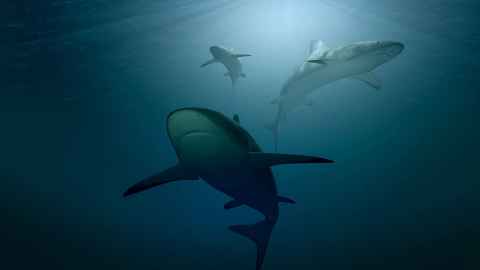Sharks - a question of retribution
1 October 2018
How long will this trigger-happy Australian government continue its barbaric cull in the name of public safety? asks Veronica Rotman (Marine Science).

First and foremost, I would like to extend my deepest condolences to the two victims, Justine Barwick, 46, and school girl Hannah Papps, 12, and their families involved in the recent shark attacks in the Whitsundays, Queensland. Both sustained injuries to one leg and are in a stable condition in hospital in Brisbane.
But questions must be asked about the retribution that followed this attack.
Logically, a maximum of two sharks could have been responsible for the attack, yet six sharks have been baited and killed in an archaic revenge tactic deployed by the Australian government to reassure public of their safety.
Baited drum lines executed were “designed to remove larger, dangerous sharks from an area,” a Fisheries Queensland spokesman said. However, this cull included a 1.2m blacktip reef shark that could not be more harmless to humans.
How long will this trigger-happy Australian government continue this barbaric cull? And what validation has been sought with this outcome?
Time and time again science has proved that the random slaughter of sharks does not reduce risk to swimmers. Between 1959 and 1976, Hawaii culled more than 4,500 sharks, the majority being larger Tiger sharks. This was deemed totally ineffective as the programme made no difference to frequency of attacks.
Why? Because these sharks are highly migratory and are rotating constantly around the globe. The only effective way to remove all risk would be to eradicate them from the ocean completely. And an ocean without sharks would cause a devastating trophic cascade which is what happens when a top predator in a food chain of ecosystem is removed.
We saw this effect in the North Atlantic, with the collapse of century old scallop fishery, when the decline in sharks drove an influx of cow-nose rays that decimated bivalve populations.
In addition, need I remind you that we did not evolve with flippers, fins or a tail and will never be completely safe in an ocean with, or without sharks. The ocean is not our home, so let’s respect that it is theirs. Humans are the apex predators of land, and sharks are apex of the ocean.
Would we kill polar bears to ice-skate safely in the Arctic?
Sharks have been around for more than 450 million years, well before evolution of the human ego. Why do we feel the need to kill what may potentially threaten us?
It is common knowledge that the likelihood of being attacked by a shark is less than being struck by lightning, dying of a coconut falling on your head, or even being killed by a cow – of which may I add New Zealand has a lot of.
So a cow cull? I don’t think so.
We enter the water consciously, and 99.9999% of the time, enjoy it enormously. But it’s like atoms colliding – the more atoms in a space, the more collisions will occur. Since the 1950s, there are millions more surfers, swimmers, and divers enjoying our aquatic environment. And logically, interactions between sharks and humans have increased.
Most of these will be completely unknown, because although Hollywood would like you not to believe it, sharks don’t give a flying f*** about us – we are not on their menu, and probably taste similar to rabbit food or something overly healthy. We simply do not have an adequate fat composition to be worth their time.
Would we kill polar bears to ice-skate safely in the Arctic?
The culling of sharks only feeds into the terror associated with these unfortunate events. Statistics show that tourism is impacted by shark attacks. The knee-jerk reaction of some idiots in office only further feeds the fear and keeps tourists at bay, and off the beaches – in a state so reliant on tourists.
The primitive mindset at play here is going to bureaucratically bite these politicians in the ass.
An incredibly insightful statement from the Australian Department of Agriculture and Fisheries states: “While sharks of this size are potentially very dangerous to humans, it is unclear if they were responsible for injuries caused to two swimmers this week..."
That statement alone verifies the foolishness of actions taken. And to tops things off, the baited drum lines employed to capture these ‘monsters’ are set close to popular swimming beaches. Sharks have a pretty damn good sense of smell, will baited hook not lure them closer in?
My question is, when will intelligence, basic logic and respect for nature be a prerequisite for the gig of highly paid government official? There are so many better solutions:
- Encourage education on how to enjoy the ocean safely in areas knowingly populated with sharks. Don’t swim with open wounds or near seal colonies, avoid dawn and dusk, and murky water near rivers.
- Exercise some common sense and don’t enter the ocean if you don’t respect the risks.
- If you have snorkelled or dived with these dinosaurs, you will know they are incredible and that co-existence is not only possible, but advantageous to all.
- There are many non-lethal alternatives that reduce risk to beach goers – the use of drone, patrols, sirens to inform public of sharks in the area, particularly in Australia.
Finally, fund some more research into when and why sharks are going into these shallow coastal areas. It is known that human activity, development, tourism and pollution disturb sharks habitat and consequently affects their behaviour.
Humans already kill over 100 million sharks per year, who’s really out for blood?
Veronica Rotman is studying for an MSc in Marine Science at the University of Auckland.
Used with permission from Newsroom, Sharks - a question of retribution published on 1 October 2018.
This article reflects the opinion of the author and not the views of the University of Auckland.